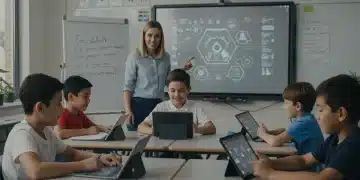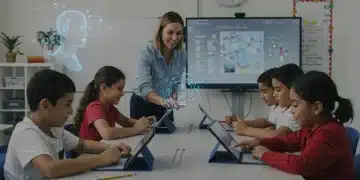Online course trends shaping the future of education

Online course trends are centered around emerging technologies, personalized learning experiences, and innovative student engagement strategies, transforming education by catering to individual needs and enhancing participation.
Online course trends are changing the landscape of education as we know it. With the increasing demand for flexible learning options, educators and institutions are exploring innovative ways to enhance the learning experience. Are you curious about what’s happening in this space?
The rise of micro-credentials
The growing popularity of micro-credentials is transforming how individuals advance their skills and careers. These short, focused learning experiences allow learners to gain specific competencies in a flexible way. With the evolving job market, the demand for practical, recognized skills is higher than ever.
What Are Micro-Credentials?
Micro-credentials are certifications that demonstrate mastery in specific skills or knowledge areas. They are typically shorter than traditional degrees and can be earned quickly. This flexibility is appealing for busy professionals and students alike. Many organizations and educational institutions are offering these programs to meet the market’s needs.
Benefits of Micro-Credentials
There are several advantages of pursuing micro-credentials:
- They focus on specific skills that are valuable in the job market.
- Flexible schedules allow for learning alongside work or other commitments.
- They often have lower costs compared to traditional degree programs.
- Employers increasingly recognize these credentials as proof of skills.
As we move forward, micro-credentials are likely to play a crucial role in lifelong learning. They support career advancement by enabling individuals to continuously update their skills. For instance, a professional in technology may earn micro-credentials in programming languages to stay competitive.
In addition to helping individuals, these credentials also benefit employers. By hiring individuals with verified skills, businesses can ensure that their team is equipped to tackle current challenges. The focus on competency through micro-credentials leads to a more skilled workforce.
Personalized learning experiences

Personalized learning experiences are becoming a vital part of education today. These tailored approaches allow learners to progress at their own pace and focus on their unique needs. This method helps increase engagement and makes learning more effective.
What is Personalized Learning?
Personalized learning means that education is customized to fit the individual learner’s goals, preferences, and previous knowledge. It uses technology and data to assess where a student is and what they need to succeed. This means every student can find their path to mastery.
Benefits of Personalized Learning
There are many advantages to implementing personalized learning:
- Increased motivation as students work on topics that interest them.
- Better retention of information through tailored learning activities.
- Flexibility in learning schedules to accommodate different paces.
- Immediate feedback that helps students improve continuously.
As technology evolves, personalized learning experiences can include interactive tools and adaptive learning platforms. These resources provide students with pathways that match their learning styles. For instance, a visual learner might engage with videos and graphics, while an auditory learner may benefit from podcasts or discussions.
Furthermore, teachers play an essential role in this process. They can guide students through their personalized plans and help them to set achievable goals. With this support, learners are likely to feel more confident in their abilities and take greater ownership of their education.
Emerging technologies in online education
The field of online education is rapidly evolving, with emerging technologies playing a significant role in transforming how students learn. Innovations such as artificial intelligence, virtual reality, and gamification are changing the landscape of education. These technologies enhance learning experiences and make education more accessible to everyone.
Artificial Intelligence in Education
Artificial intelligence is becoming a powerful tool in online learning. It can analyze student performance and offer personalized recommendations. For example, AI-driven platforms can suggest resources that match a learner’s pace and style. This tailored approach helps students to focus on areas where they need improvement.
The Role of Virtual Reality
Virtual reality (VR) is another exciting technology that enriches online education. It allows students to immerse themselves in realistic environments. This can be particularly useful in fields like medicine or engineering, where practical experience is crucial. Students can practice skills in a safe, controlled setting that mimics real-life scenarios.
Gamification of Learning
Gamification is the process of applying game-like elements in education to enhance engagement. By integrating points, badges, and challenges, educators can motivate students to complete tasks and participate actively. This approach makes learning fun and encourages a competitive yet collaborative atmosphere.
As we embrace these emerging technologies, the future of online education looks promising. With tools that adapt to individual learning needs and offer interactive experiences, students can gain knowledge more effectively than ever before. The integration of these technologies allows for continuous improvement and innovation in teaching methods.
Trends in student engagement strategies

Trends in student engagement strategies are crucial for creating active learning environments. Many educators are adopting innovative methods to keep students interested and motivated. Engaging students effectively can lead to better learning outcomes and a more enjoyable educational experience.
Active Learning Techniques
One of the leading trends is the use of active learning techniques. This approach encourages students to participate actively in their education rather than passively receive information. Techniques like group discussions, peer teaching, and interactive problem solving allow students to engage directly with the material.
Use of Technology
Technology is another powerful tool that enhances student engagement. Online platforms and educational apps can make learning more interactive and fun. For instance, gamified learning apps reward students for their progress, encouraging them to stay engaged. Additionally, tools like online polls and quizzes during lessons can provide immediate feedback and keep students involved.
Building Community and Collaboration
Creating a strong sense of community within a classroom is essential for engagement. When students feel connected to their peers and instructors, they are more likely to participate. Collaborative projects and group work foster relationships and allow students to share ideas and learn from each other.
Furthermore, recognizing and celebrating student achievements, both big and small, can boost morale and encourage ongoing participation. This positive reinforcement can create a cycle of motivation that enhances overall engagement.
As we explore these trends in student engagement strategies, it is evident that adopting various methods can cater to different learning styles. By blending technology, active participation, and community-building efforts, educators can create dynamic classrooms that inspire students to reach their full potential.
In summary, the landscape of online education is changing rapidly, driven by emerging technologies and innovative student engagement strategies. By focusing on personalized learning experiences, utilizing advanced tools, and fostering a sense of community, educators can create dynamic learning environments. As we embrace these trends, we can empower students to take charge of their learning, ensuring they have the skills needed for the future. Adapting these strategies will lead to more effective, enjoyable, and accessible education for all.
FAQ – Frequently Asked Questions about Online Education Trends
What are micro-credentials and why are they important?
Micro-credentials are short, focused certification programs that validate specific skills. They are important because they allow learners to demonstrate expertise in a targeted area, often valued by employers.
How does technology enhance student engagement?
Technology enhances student engagement by providing interactive tools and resources, such as gamified learning apps and online discussions, which make learning more fun and dynamic.
What role does personalized learning play in education?
Personalized learning tailors education to individual students’ needs, allowing them to learn at their own pace and focus on areas where they need improvement, leading to better outcomes.
Why is building a sense of community important in online education?
Building a sense of community fosters relationships among students and instructors, which can increase motivation, participation, and collaboration, creating a more engaging learning environment.





